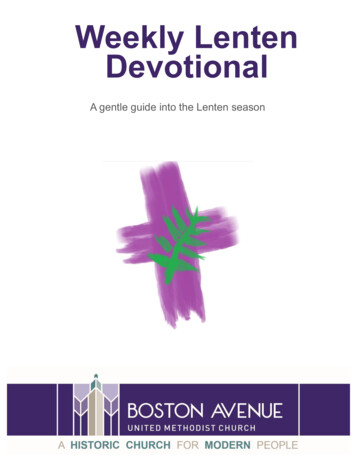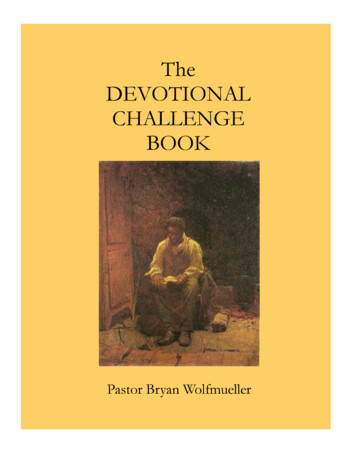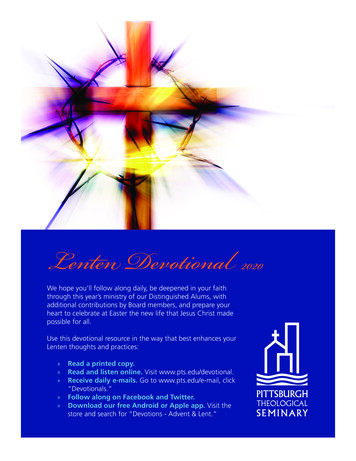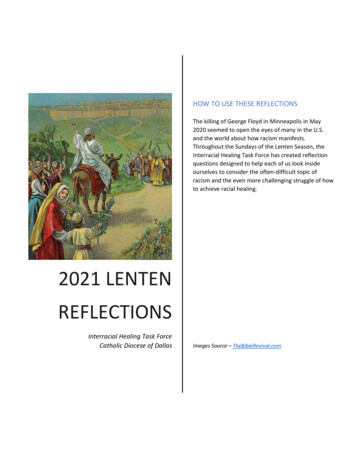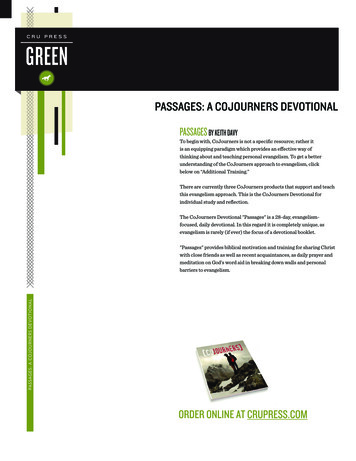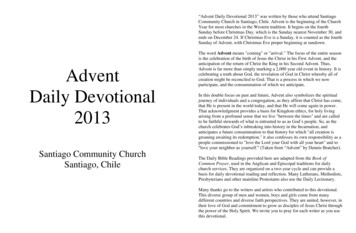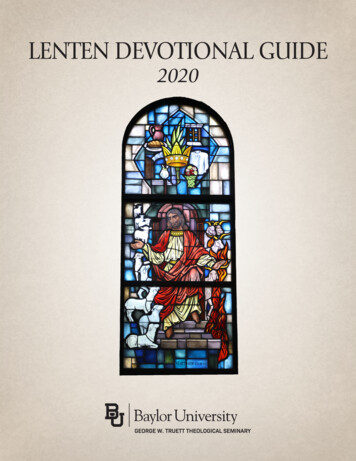
Transcription
LENTEN DEVOTIONAL GUIDE2020
As we follow along on the journey with Jesus to the cross, the season of Lent engages our heartsand minds so that we are truly ready to celebrate once we arrive at Resurrection Sunday. Lent is atime of contemplation, a time of dedication, and a time of preparation. In our tradition, we havesometimes been tempted to gloss over Lent and Holy Week in a rush to get to Easter, but it is inthe journey of contrition and repentance that the true splendor of Christ’s triumph over sin anddeath is magnified. To fully realize the beauty and hope of the Risen One who loves us so deeply,we must also know the disorientation of the darkness.Students, staff, and faculty of Baylor University’s George W. Truett Theological Seminary havewritten these Lenten devotionals from Ash Wednesday to Holy Saturday. Each 2020 devotionalentry is paired with a section of Matthew so that we might read through the entirety of thegospel while observing the season of Lent. If you are viewing the guide digitally, the dailyScripture readings are hyperlinked for easy access.Our hope and prayer in compiling and sharing these reflections is that they might encourageyou and enhance and deepen your experience of the Lenten journey this year. It is our hope thatyou will use and share this guide freely.In Christ,BEN SIMPSONOffice of Spiritual FormationSHAWN BOYDThe Kyle Lake Center for Effective PreachingADAM JONESThe Kyle Lake Center for Effective Preaching
ASH WEDNESDAY, FEBRUARY 26Matthew 1:1-17I get why you want to skip to verse 18. Verse 1 seems to be all I need, and instead of trying to read through a bunchof Old Testament names, how about we call them all “yada yada yada” and be done with it? It is as if Matthew putthe credits at the beginning of the movie to force everyone to sit through them. Not cool, Matt.Some of the names we do know well: Abraham, Isaac, Jacob, King David, and Solomon. We know these men because of howGod’s interaction and promises with his creation developed. Many of the names you read are only memorialized here inScripture. Maybe you remember a handful of the lesser known names. That is great—your Sunday School teacher would beproud.But Matthew’s genealogy is also peculiar with the inclusion of women. The burden of proof and significance of one’s lineagecame from who is the father and who was his father. Including women is not just unnecessary and uncommon but alsounwelcome. Who are the women he included?Tamar, the widow of two of Judah’s sons. Judah, fearing the life of his third son, denied Tamar his hand in marriage and thusdenied her a future. Tamar used her wits to steal back a future. She tricked her former father-in-law into laying with her andgave birth to twin sons.Rahab, a Gentile prostitute, was living in Jericho when two Israelite spies snuck in to survey their promised land. Rahabtreasonously hid the two men from the king of Jericho.Ruth, a woman from Moab whose husband and father-in-law die, but who is unwilling to reject or depart from her motherin-law, Naomi. Ruth followed Naomi home and won her way into the heart of Boaz.Bathsheba, who might not be explicitly named in your translation. In the NIV, it designates her as, “whose mother had beenUriah’s wife.” Bathsheba was King David's failed one-night stand.Mary, a virgin girl, betrothed to be married to Joseph. Mary will not become the first girl to become pregnant before she ismarried, nor the last, but will claim her virginity despite what is growing inside of her.Why does Matthew scandalize his genealogy by including these women? He mixes in foreigners, prostitutes, seduction,failures of Jewish leadership, and stories of pain and heartache.Matthew did this because it is the truth. Jesus is born as the fulfillment of the promise—a promise that is bigger than theJews and what they hoped for in a Messiah.Jesus is born into a world of scandal, sin, and pain. If this was not the state of creation, then why would Jesus need to come?The cross lies ahead for Jesus. He goes there not just so he can save the people we like, but so that all might be saved.I invite you to think about your past sins, the great atrocity you bore upon the world. Despite this, God wrote you into hisfamily. He willingly scandalized his family tree by giving you a branch on which to rest.Prayer:Why me, oh God, a wretched sinner, would you send your perfect son to die? Understanding your love will forever bemystery, living in your love will forever be majesty.SHAWN BOYDProgram Coordinator for the Kyle Lake Center for Effective Preaching andGrant Coordinator for the Lilly Endowment Preaching Grant
THURSDAY, FEBRUARY 27Matthew 1:18-25The genealogy that opens Matthew’s Gospel establishes that Jesus has the appropriate family pedigree to be theMessiah. But there’s a catch: the family line traced by the genealogy belongs to Joseph, and Joseph is not Jesus’sbiological father. How can Jesus be part of the appropriate family line to be Israel’s Messiah if he is not Joseph’sbiological son? Our text today answers that question.Joseph and Mary are betrothed. According to Jewish law, a betrothal is legally binding and carries much moreweight than a modern engagement; breaking a betrothal requires a divorce. However, Joseph and Mary are notyet allowed to consummate their marriage. When Mary becomes pregnant by the power of the Spirit, Josephnaturally assumes either that Mary has been unfaithful or that another man has forced himself upon her. Eitherway, the betrothal has been irreparably violated and Joseph cannot marry her. He has two options. First, hecould demand a public investigation to determine the circumstances of Mary’s impregnation. This would exposeMary to public disgrace but absolve Joseph of any responsibility. Second, Joseph could divorce her secretly. Thiswould spare Mary the public shame but require Joseph to pay the financial obligation he owes to Mary and herfamily should he end the marriage. Joseph, being a righteous man, opts for the second choice.Before Joseph can go through with his decision, he has a dream in which an angel of the Lord tells him notto divorce Mary. Her pregnancy is from the Holy Spirit and fulfills an ancient prophecy from Isaiah 7. Jesus isdestined to be the Messiah of Israel. Joseph awakens from his dream and follows the angel’s instructions. Josephtakes Mary as his wife and claims Jesus as his son. Although it is not readily apparent to our modern eyes, Josephadopts Jesus. As Joseph’s adopted son, Jesus is now a fully legitimate and legal member of Joseph’s family line.This resolves the conundrum posed by the genealogy. But keep in mind that this is not a solution God thoughtup at the last minute. God did not paint himself into a corner and then exploit a loophole to fix the problem;Jesus’s adoption by Joseph was part of God’s plan from eternity past. From the very beginning, God planned touse this adoption to help bring about his salvation of the world. Just as Jesus’s substitutionary death on the crossand resurrection from the dead were part of the plan from the beginning, so also was Jesus’s adoption as Joseph’sson.Questions for Reflection:1. Joseph has the right to expose Mary to public disgrace, but he chooses the way of mercy at cost to himself. Howmight we as Christians set aside our own rights to take the path of mercy, and in so doing, imitate Christ himself(Philippians 2:5-11)?2. How does this story reshape our understanding of adoption? How might this story give greater depth andmeaning to the act of claiming a non-biological child as one’s own?JOSHUA SHARP
FRIDAY, FEBRUARY 28Matthew 2:1-12“When I am walloped by Christian condescension toward those who are not Christian, I remember how manyreligious strangers played lead roles in Jesus’s life: the Canaanite woman who expanded his sense of agency, theSamaritan leper who showed him what true gratitude looked like, the Roman centurion in whom he saw more faiththan he had ever seen in one of his own tribe. This is one of the reasons why I remain a devoted student of theBible: because what it says is so often not what I have been taught it says, or what I think it says, or what I want itto say. Scripture has its own voice—sometimes more terrible than wonderful—but it has never failed to reward myclose attention, either with a fresh hearing or with the loud slamming of a door that tells me to come back later.”-Barbara Brown Taylor, Holy EnvyThis book led me to look with fresh eyes upon this passage about the wise people who visit Jesus after his birth.These are people whom we gladly include in our Advent season every year and in almost every Nativity scene.We even have a Christmas song all about them. Ironically, however, I have never fully considered what it meansto include people of a different faith and background in this story. These are more of those “religious strangers”who played a vital role in Jesus’s life, proclaiming the international importance of his birth. It is also throughthese religious strangers that we see how unlimited God is in ways to communicate. God can use the stars tospeak and wants to use even those we have deemed as the “other” to proclaim the importance of the life of theChrist child.In Jesus’s life, and even leading up to his death, we learn how much he likes to surprise us. The God of allcame to be born as a baby—the most vulnerable creature. The God of all went to death on a cross—the mosthumiliating sentence. In all of the moments in between his birth and death, Jesus kept inviting the peoplearound him to embrace the paradox. Jesus still invites us to do that because he never stops drawing all peopleto himself. When we have written off the religious stranger as lost, Jesus might have been speaking to them andusing them for good all along.As we move through this Lenten season, I hope that we will have eyes to see how God always has and always willact through those we have deemed as “other.” I hope we will have ears to hear how God keeps speaking throughthose we least expect to speak truth. I hope we will have arms that are open to welcome those who seem themost different than us. And I hope we will have lives that proclaim the beauty of the imago Dei in every one ofus.Prayer:Creator God, expand our minds and our hearts so that we might align with your paradoxical kingdom, and may wetake joy in the least expected like you do. Amen.BRIANNA CHILDS
SATURDAY, FEBRUARY 29Matthew 2:13-23You’d be surprised how God works in the desert.People often overlook that dusty, sunny, and dry ecosystem, but God has a knack for transforming ourdeserts into places of hope. In the reading today, the infant Christ escapes death and finds safety inthe barren land of Egypt because God had been faithful to warn Joseph in a dream. The journey musthave seemed crazy to Mary and Joseph. After finally getting comfortable in Bethlehem and the visit ofthe Magi, seeking refuge in a foreign nation was likely the last thing on the mind of these tired youngparents. But just as the Joseph of Genesis had found refuge in Egypt from his violent brothers and theinfant Moses had found safety in a basket floating down the Nile, the Holy Family was being called to adesert journey of faith. What seemed to be a place of death became a refuge of hope, nurturing, and faithfor the Holy Family.God blessed me with a desert experience before seminary. I graduated college in May 2014 with nodirection and no idea where to go. In a series of events which could only be described as providential, Ifound myself not in Egypt, but in the beautiful plains of the Texas panhandle. The terrain was rugged,rain was scarce. But in the sacred space of a rural church and while working in a community collegecampus ministry, God bestowed grace upon grace. I would have never chosen that desert on my own, butit soon became a refuge of hope, nurturing, and faith.You’d be surprised how God works in the desert.When the danger had passed, the Lord was faithful to call Joseph, Mary, and the Christ child home toNazareth. This, of course, was not the only time Jesus would be called to a desert journey. In Chapter 4,Christ will spend 40 days fasting and seeking God while enduring temptation. Perhaps the desert is not asingle-use refuge, but a place to which we return time and time again. A place of surrender to the dreamsof a loving God. A place of fasting. A journey of denying ourselves for our own good.Christian, welcome to the desert of Lent 2020. Christ has called us here together in prayer and fastingthat we might seek God’s holy face. This will not always be a comfortable journey. The sun will be hot,the temptations will be myriad, the land may seem unfamiliar. But perhaps in this desert place, Godis working all things together for the good. Perhaps as we deny ourselves and seek our maker, we willidentify with the God who took on our flesh, the God who goes to the desert, the God who goes to thecross for us. Keep your eyes open in this season. You never know what good you may find on the journey.God bless you as you see God work in this desert. Amen.JACOB BRENTON
SUNDAY, MARCH 1Matthew 3:1-17John the Baptist might best be understood as a road construction project manager. He yelled out orders to makethe way clear for the Messiah. His orders included the instruction to repent—to turn from that which causedhazards in one’s life and way to the Messiah. He had a curious wardrobe, not the usual hard hat and brightyellow or orange vest sported by road workers. Instead, he wore a long shirt made of camel hair, secured aroundhis waist with a belt. His lunch bucket was organic, natural food: locusts and honey. I suppose one would wantsomething sweet to slather on the bugs to be able to swallow them.This road construction project manager attracted people, all kinds of people. They heard his warningwords and came to him to undergo the ritual of baptism in the Jordan River, demonstrating their washingaway of roadblocks that get in their way from getting to know the Messiah. John the Baptist claimed thathe was not the Messiah, but was pointing toward him. That’s what his message and his practice of baptismdid; it pointed down the road to someone greater than John the Baptist.John said, “I baptize you with water for repentance. But after me will come one who is more powerfulthan I, whose sandals I am not fit to carry.” John knew his place. He realized that he was only preparingthe road for the Messiah. He wasn’t the Messiah. John points to a promise: “He will baptize you withthe Holy Spirit and with fire. His winnowing fork is in his hand, and he will clear his threshing floor,gathering the wheat into the barn and burning up the chaff with unquenchable fire.” Strong words. But,then again, one isn’t surprise by such salty and threatening language since John’s occupation was spiritualroad construction.Even as John was speaking, Jesus came to him to be baptized. The Son of God who has nothing fromwhich to repent requested baptism. Even John the Baptist said to him in astonishment, “I need to bebaptized by you, and you come to me?” Jesus went under the water of the Jordan River to “fulfill allrighteousness,” and at that moment heaven opened, the Spirit came upon him, and the voice of the Fatherspoke these powerful words, “This is my Son, whom I love; with him I am well pleased.” The road Johnthe Baptist had constructed led right to Jesus, the Messiah.When I was a young, new Christian, I thought that all the Johns in the Bible were the same: John theBaptist, John Mark, and John the author of the Gospel of John, along with the three letters and the Bookof Revelation at the end of the Bible. I was confused. Until I sorted out the Johns—and this John sortedout me. This John, John the Baptist, is a provocative road construction project manager who does his joband does it well. He points us to the savior.The road is made clear for us, too. We are challenged by this character, John the Baptist, to recognizeJesus as Messiah, to give our lives to him because he was tasked to give his life for us.Prayer:Our Great God, Father, Son, and Holy Spirit, clear the road of my life from all hindrances and sin that I might beled to follow Jesus, the Messiah, wherever you lead me. In Jesus’s name, Amen.SCOTT M. GIBSONProfessor of Preaching; Holder of the David E. GarlandChair of Preaching; Director of the PhD in Preaching Program
MONDAY, MARCH 2Matthew 4:1-11After 40 days and 40 nights of fasting, Jesus finally became hungry. I would have been famished a mere 40 hoursin. Nevertheless, when the enemy comes to tempt Jesus to turn the stones around him into loaves of bread toeat, Jesus responds by saying, “It is written, ‘One does not live by bread alone, but by every word that comesfrom the mouth of God.’”Have you ever been in the kitchen to smell fresh baked bread being pulled out of the oven? The smell thatimmediately fills the air is nothing short of heavenly. I imagine the enemy tempting Jesus to turn those stonesinto piping hot, sweet-smelling loaves of bread. But Jesus refrains. Though my heart is lifted just imaginingpulling apart a loaf of freshly baked bread, watching the steam escape through the cracked open crust, Jesustestifies of something much more satisfying.“One does not live by bread alone, but by every word that comes from the mouth of God.” Better than freshbaked bread, and all that life has to offer, is every word that comes from the mouth of God. Do we live longingfor every word that comes from God? Like our stomach groans with hunger pains, does our soul ache for God tospeak to us? Is God’s word our very life and breath?Once the tempter has tempted plenty, Jesus says, “Away with you, Satan! For it is written, ‘Worship the Lord yourGod, and serve only him.’” Only him. Only God. Once Jesus says this, the enemy leaves him.Paul writes in his letter to the Romans, “Let love be genuine; hate what is evil, hold fast to what is good” (12:9).In our world today, we have gotten pretty good at hating what is evil, but we often fail to hold fast to what isgood. I fear we have forgotten what good is.In the wilderness, Jesus shows us not only what is good, but what is better. The enemy comes to tempt Jesuswhen he is at his weakest. Rather than merely hating what is evil, Jesus holds fast to what is good. By speakingout the good and life-giving word of God, evil flees from him. The enemy leaves him.Prayer:Father God, we spend so much time fleeing from what is evil, that we forget to cling to what is good. We confessthat we have hungered for so much more than you, God. We want to worship and serve you, only. We want to liveby every word that comes from your mouth. Help us to position ourselves to hear from you. We believe your word isbetter than life. Help us believe by the power and presence of your Holy Spirit who indwells us. Amen.Spiritual Formation Practice:Though we may miss a meal here or there, we never forget to eat. And yet, how often do we forget to listen forevery word that comes from the mouth of God? Whether you are a college student, a single mom, a pastor, abusinessman, or a grandparent, I challenge you to dedicate one meal or snack time a day to dining with God. If youhave a family, I encourage you to invite them into this daily spiritual practice. Bring God’s word to the table andinvite him into the conversation. Reflect on how his word relates to your day. Ask him to give you (and your family)life through his word.MEGHAN HENDRICKSON
TUESDAY, MARCH 3Matthew 4:12-25Who am I?Throughout my life, I have asked this question often. Who am I to preach the Gospel of a perfect Savior whosacrificed his life for me? Who am I to share about the work of a magnificent God, who, through power andmight, created the heavens and the universe? Who am I?In this passage, we see Jesus beginning his earthly ministry. We read about a perfect Jesus beginning to call othersto repent. As a follower of Christ, I have asked myself that “Who am I?” question far too often. It can be easyto think to ourselves and ask God, “Why not choose someone more eloquent?” or “Why not choose someonemore successful?” or “Why not choose someone more powerful than I?”Jesus could have chosen the most powerful people of the time, but that’s not what he did. As we continue to readthis passage, we see that he chose fishermen. He chose ordinary, common people to assist him in his ministry.Even after two thousand years, he is still calling ordinary people like you and me to be witnesses of the work ofJesus Christ and the sacrifice he made for us on the cross. This perfect savior calls imperfect people today just ashe called these fishermen to tell of his love, grace, and majesty.So, when I have asked that question of “Who am I?” I am often met with the response, “You are my belovedchild; someone I have called to share my good news.” Just as he called ordinary fisherman, so too has he calledme. As Christians, each of us are called, wherever we are, whatever we do, to be disciples for Christ and toproclaim his wonderful news of hope, healing, and restoration.This, of course, isn’t an easy journey. Later, in Matthew 16, Jesus tells His disciples to take up their crosses.Jesus came to give his life to save others. As sharers in his ministry, the disciples were told that they would facehardships and persecution. As they faced hardships, we also will face hardships. And yet, God can use ourcircumstances for his glory, for his purpose to bring hope and healing to so many who are lost and broken.As you make your way throughout life’s journey and as you focus on Christ’s sacrifice this Lenten season, beencouraged, be motivated. God chose you. He chose you to be his disciple. So, share his good news and sharehow he has redeemed you.Prayer:Lord Jesus. Guide me to be your disciple and serve you. Remind me daily of the love you showed for me on thecross. Remind me that you called me to share this wonderful love with others. Use me. All of me. My trials. Mycircumstances. My abilities. Every part of me. To bring others closer to you. So that they can share in this amazinglove. In your most precious name, Amen!JOSHUA STEWART
WEDNESDAY, MARCH 4Matthew 5:1-12Lent is a solemn time of directed spiritual focus. Beginning with Ash Wednesday, it is a time to remember thatfrom dust we came and to dust we shall return. I don’t think we meditate or contemplate this somber attitudeenough. During Lent we often engage in a practice of fasting from something in order to remember the sufferingof Christ. In our small sacrifice, we remember Christ’s ultimate sacrifice for us.How does this connect to the beatitudes? The passage begins with the people sitting down and learningfrom Jesus. We too, during this set apart time, are meant to sit at the feet of Christ and remember hissuffering and how he taught us to live.Reading the beatitudes reminds us what Jesus considered blessed. When we are poor in spirit, when wemourn, when we are meek, when we are hungry and thirsty for righteousness, when we are merciful,when we are pure in heart, when we make peace, when we are persecuted—this is when we areblessed. As we remember the death of Christ, may we also remember that we need to die to our ownpresuppositions of what it means to be blessed. These simple phrases may be common ideals for thoseof us who have been in the Christian faith, but they are no less revolutionary. In the same way, it may becommon to pause for 40 days in remembrance of Christ’s death, but it is no less revolutionary.May we gather at Jesus’s feet and be taught. May we sit in our poor spirits, our mourning, our meekness,our hunger and thirst, in a merciless world, a chaotic world, and seek the kind of blessedness thatcan only come from a resurrected savior who needed to suffer and be crucified in order to bring thisrevolutionary kingdom.Practice:Pray through each beatitude, asking the Holy Spirit to make you more and more kingdom-minded. Which beatitudeis most revolutionary to you? How can you practically engage in sitting in Jesus’s teaching this Lenten season?JESS GREGORY
THURSDAY, MARCH 5Matthew 5:13-48In the 2005 movie Coach Carter, Ken Carter returns to his high school alma mater in Richmond, California,to be the new basketball head coach. Ken Carter was the leading scorer in the school’s history. On his first daycoaching, he prints out contracts of requirements of playing for and representing Richmond Basketball. Thecontracts stipulate wearing coats and ties on game day, maintaining a 2.3 GPA, and calling one another “sir.”Immediately after coach Carter reads the contract, two of the team’s leading scorers from last year leave the gym.Coach Carter was not afraid of change, and therefore caused controversy.After the team won a mid-season tournament to remain undefeated in the season, Coach Carter gets back theprogress reports of the players only to find them failing classes. In indignation, he locks up the gym until theteam collective raises their grades to a 2.3 GPA. This included practices and important games of the season. Thecommunity and the Board of Education were outraged and confronted the coach saying, “You’re being toohard. Basketball is all that these kids have!” Coach responded and said, “Maybe that is precisely the problem—basketball shouldn’t be the highlight for their lives.” Coach Carter wanted every one of the players to go tocollege and change the culture of violence and drugs that plagued students from Richmond.The community and Board of Education decide to unlock the gym, to which coach Carter subsequentlyresponds,“Then, I’ll have to quit.” As he goes to the gym to pack up his things, he sees all of his players in thecenter of the gym studying. They told him that they’ll sit out until they get grades up; they didn’t want to losetheir coach. One of the more transformative scenes of the movie came when Mr. Cruz, a troubled basketballplayer whose cousin was recently killed by gun violence, quoted, Marianne Williamson:“Our deepest fear is not that we are inadequate. Our deepest fear is that we are powerful beyond measure. It is our light,not our darkness that most frightens us. We ask ourselves, ‘Who am I to be brilliant, gorgeous, talented, fabulous?’ Actually,who are you not to be? You are a child of God. Your playing small does not serve the world. There is nothing enlightenedabout shrinking so that other people won’t feel insecure around you. We are all meant to shine, as children do. We wereborn to make manifest the glory of God. And as we let our own light shine, we unconsciously give other people permissionto do the same.“The team would raise their grades and go to play for the playoffs. However, they lost to the number one rankedteam, St. Francis. After the loss, Coach Carter addressed his team: “I came to coach basketball players, and youbecame students. I came to teach boys, and you became men.” Jesus Christ, in the sermon on the Mount, invitesus to be the salt and light of the world. Immediately, he follows with exhortation of internalizing the Mosaic law.For this Lenten season, let us not just to give up one or multiple things for the sake of another. Instead, let uspractice resurrection—our transformation into being the salt and light—for the liberation of the world.MICHAEL LIGA
FRIDAY, MARCH 6Matthew 6:1-18The Lord’s Prayer—a prayer so familiar to Christians that many of us still recite it with “Thou”s and “Hallowed”scenturies after we started using different words everywhere else. But perhaps re-examining the Lord’s prayer canhelp us see it again as living words given to the church (Stanley Hauerwas, Matthew: A Theological Commentary).Our Father, which art in Heaven, Hallowed be thy name.God’s name is Holy, and God reveals his names for our sake. “I am that I am,” God said to Moses, rejecting anyattempt to contain him. We are given dozens upon dozens of names for God in Holy Scripture that we maycry out in prayer. Here, Jesus enables us to approach God as “our Father” at any time. Our conception of Godas Father is not dependent on our good experiences with fathers. Rather all parental love, and all love, is to bemeasured against the Father’s love for the Son. To Hallow God, and to say, “Thy Kingdom come, thy will be done onearth as it is in heaven” is to pray for God to continue to disrupt the Kingdoms of this world. To pray God’s willbe done is to pray that God’s will would shape, and lead, our wills. The will of humans is to reject Jesus and nailhim to the cross. The will of God disrupts that will and ensures that what humans meant for evil, God meantfor good. God’s will insists that when we strike Jesus down, he is lifted up, exalted. That when humans sentenceJesus to the death penalty and crucify him, in the same act God enthrones him. And we pray that what Godrevealed in Jesus would be culminated here at his return: God’s Kingdom on earth.National Geographic Channel had a program called “Doomsday Preppers.” It’s about those who plan and storeup goods for imagined civilization-ending scenarios. But, we non-“preppers” are not as different from them aswe put on. Asking God to “Give us this day our daily bread” stretches us thin. But why? Because our attempts tocontrol our own destinies always leave us in a mindset of scarcity: our anxious plotting is certain we can neverhave enough. Most of us are one peculiar hobby away from being exactly like Doomsday “preppers.” Praying forour daily bread insists on our reliance on the one who is the Bread of Life.And forgive us our debts as we forgive our debtors is doubtlessly the hardest, the weightiest line we pray in the Lords’prayer. To accept we have debtors, we owe something to others. It is easy to misread this line about forgivenessas some sort of “I scratch your back; God will scratch mine” transaction. Instead, we learn that we are sinnersin need of forgiveness and become subject to the Kingdom in which forgiveness is the way of
written these Lenten devotionals from Ash Wednesday to Holy Saturda y. Each 2020 devotional entry is paired with a section of Matthew so that we might read through the entirety of the gospel while observing the season of Lent. If you are viewing the guide digitally, the daily
